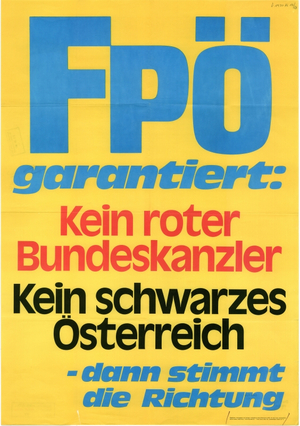
National Council election 1970
At the National Council election of 1 March 1970, Friedrich Peter again stood as lead candidate for the FPÖ. The Freedom Party obtained 5.52 per cent of the vote, which constituted an increase of 0.17 percentage points and resulted in 6 National Council seats (±0).
The SPÖ was able to increase its share of the vote and its number of seats, which meant that it took over the number one slot from the ÖVP, which suffered corresponding losses.
Brief description of the election campaign
The 1970 election campaign was the first in Austrian history that was also contested via television. For the first time ever, there were television debates and advertising spots. The SPÖ, with Bruno Kreisky at its head, was able to use this medium cleverly to its own advantage and reaped the corresponding rewards.
The Freedom Party again campaigned with Friedrich Peter at the helm and its central slogan was “Formel 70 – Die Richtung stimmt” (“Formula 1970 – the direction is correct”). The term “Formel 70” referred to the FPÖ’s election programme, which contained new policy proposals based on “Ordnung 70” (“Order 1970”), a reform concept for the democratic reorganisation of Austria, as had been advanced under Alexander Götz.
In addition, the Freedom Party once again presented itself as the sole alternative to the two major parties and it also put up posters explicitly saying that the FPÖ would guarantee that there would be neither a red Chancellor, nor a single-party ÖVP government: “Kein roter Bundeskanzler - Kein schwarzes Österreich” (No red Federal Chancellor – No black Austria”).
Government formation
The winner of the election was Bruno Kreisky’s SPÖ, which initially engaged the ÖVP in protracted coalition negotiations that ultimately failed. Thereupon, Kreisky formed an SPÖ minority government with FPÖ support. In exchange, the FPÖ obtained an electoral system reform which removed the discrimination of smaller parties and increased the number of National Council seats from 165 to 183
